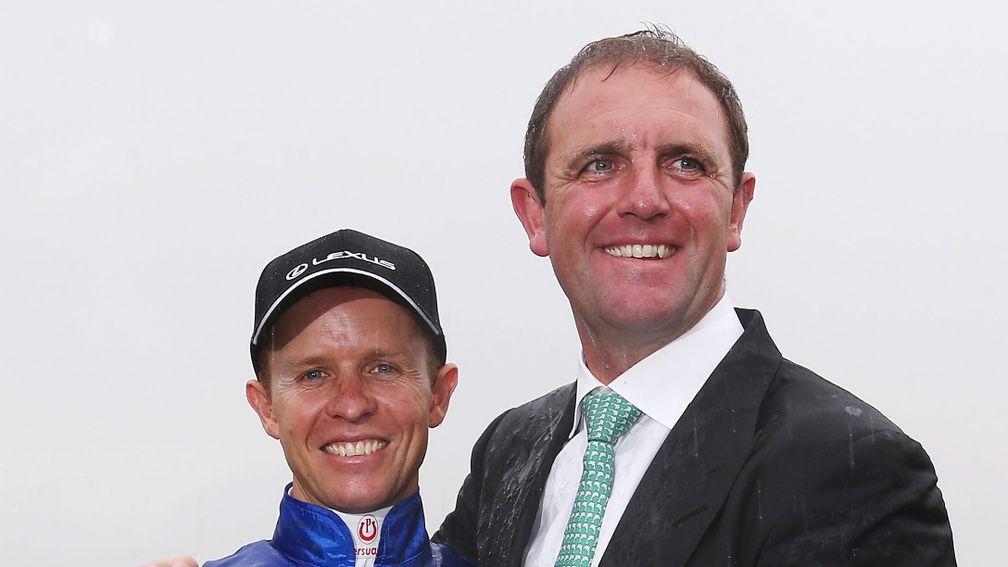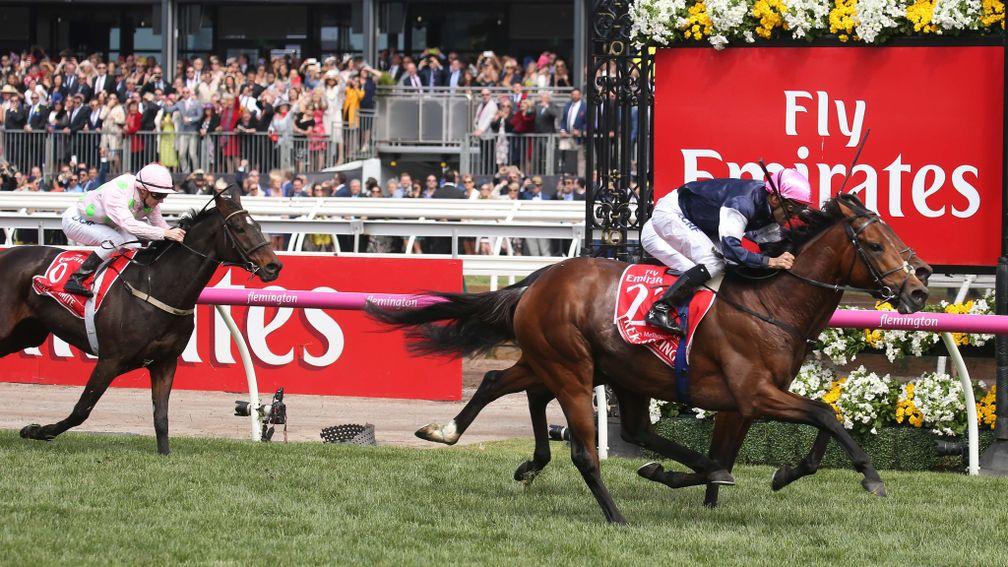European three-year-olds likely to be treated more harshly for next year's Cup

Joseph O'Brien's Melbourne Cup victory with Rekindling changed Charlie Appleby's view of what he needed to bring down under and after his Cross Counter became the second European three-year-old in as many years to win the race that stops a nation, Racing Victoria's chief handicapper Greg Carpenter has accepted he may need to treat the age group more harshly next year.
Carpenter has too small a sample size to consider alterations to the weight-for-age scale for European three-year-olds running in Australia just yet, but with Rekindling winning last year and Cross Counter and Rostropovich finishing first and fifth in the 2018 edition he has enough evidence to consider altering the marks of any such runners next year.
"The race, and the way it's handicapped, will continue to evolve," he said. "I'll definitely think about how I integrate those northern hemisphere three-year-olds into the handicap and it may well be they will be pushed a little bit deeper into the handicap given the last two renewals.
"Both were very good horses but they hadn't won a Group 1 and they've proven to me, despite their immaturity, they are very strong at the end of two miles. I'll think about how their performances will be reflected in horses like them who come here in future years, but they could expect to get more weight – they might be higher in the handicap."
He added: "But it's not a one shoe fits all, it's very much my view of the horse."
Carpenter added that should the Classic generation continue to run well, then altering the weight-for-age scale itself may be needed.
"That is one possibility," he said. "We have our weight for age scale and we've a scale for how we fit northern hemisphere-bred horses into our scale, but largely that's been untested as we've had very few come in the last 50 years.
"Nothing stays the same forever, the weight-for-age scale's changed all over the world and continues to do so. I wouldn't dismiss reviewing that, but it doesn't tie me down as it's up to me to work through where I'm going to integrate them into the handicap.
"We've now seen Rekindling and Cross Counter not only run to their BHA rating, but exceed it, and what's been so impressive to me is these are the youngest horses in the field, they're the most lightly raced, and both years they've surged past older horses in the last 100m."
While in Britain weight for age is applied before the order of entry is established, effectively meaning three-year-olds struggled to get into races like the Ebor – from which the age group is now barred – and Cesarewitch.
For the Melbourne Cup the order of entry is established by how many pounds below the benchmark a horse is (effectively their handicap rating) and then weight for age is applied after. It means highly-rated European three-year-olds not only have an excellent chance of getting into the race, but getting in with a light weight.
However, it has not always been the recipe for success. The Aidan O'Brien-trained Mahler ran well in 2007 to finish third off a rating of 113, but Alessandro Volta the following year, Tres Blue in 2013 and Bondi Beach in 2015 all bombed out.
"The race is a handicap and we've had very few northern hemisphere three-year-olds contest the race," continued Carpenter. "On that limited data pre Rekindling we were quite comfortable with where we had the European three-year-olds.
"But last year Rekindling won as an inexperienced northern hemisphere three-year-old, and we saw something similar on Tuesday.
"Cross Counter came in off seven starts and ran past seasoned stayers and was very strong at the end. Rostropovich also ran well in fifth. When you get more and more evidence about how a certain profile of horse is performing in the race then you're entitled to think about how you integrate them into the form.

Werribee questions answered
There has been an unusually high number of injuries for horses based out of Werribee this year, leading many to ask questions of the facility.
Every trainer's representative spoken to has said the ground has been fine and it has been a total coincidence, with the turf track at Werribee reportedly maintained at a soft 5. There is also a synthetic surface.

"Over the past five carnivals we have housed an average of 21 horses per year at the Werribee International Horse Centre. That number has doubled to 42 this year, which has likely amplified the story regarding international horses and reported injuries.
"While the overall feedback regarding the track and facilities at Werribee has been positive, we'll take a look at the injury rate amongst visiting and imported horses as part of our annual process and determine whether there are any identifiable risks that we can address for the future."
Stier also said the process of waiting for European trainers to wake up and confirm horses who had scans showing they were injured and would miss a race will be part of the review. The current system creates a potential integrity concern as for a period of several hours a horse could be known to be injured and unable to race yet remain in the betting due to the official announcement not being made without the trainer's permission.
Due to the time difference between Europe and Australia suspending the market every time is not really an option and so Racing Victoria will consider better ways to handle such situations.
For complete coverage of racing and bloodstock in Australia and New Zealand, download ANZ Bloodstock News every day
Published on inAustralia
Last updated
- 71-year-old Australian jockey who rode his first winner in 1969 enjoys a fairytale success on final mount
- 'The Melbourne Cup is the goal' - Vauban to stay in Australia after Rich Ricci sells star for A$2 million
- The Melbourne Cup Carnival ends with remarkable numbers that might make some in Britain and Ireland gulp
- Via Sistina dazzles again as former British star continues her sensational spring with Flemington romp
- Flemington: Yulong gets ready for Via Sistina's Saturday star turn with a Classic triumph
- 71-year-old Australian jockey who rode his first winner in 1969 enjoys a fairytale success on final mount
- 'The Melbourne Cup is the goal' - Vauban to stay in Australia after Rich Ricci sells star for A$2 million
- The Melbourne Cup Carnival ends with remarkable numbers that might make some in Britain and Ireland gulp
- Via Sistina dazzles again as former British star continues her sensational spring with Flemington romp
- Flemington: Yulong gets ready for Via Sistina's Saturday star turn with a Classic triumph